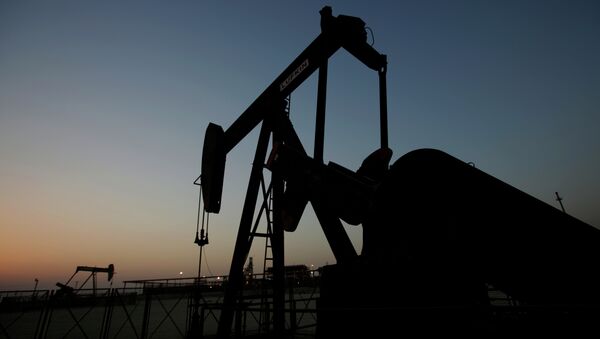Kristian Rouz – Global oil prices dipped this past week, ending a month-long rebound, which some observers had seen as a good sign for both the corrupt petrocracies around the world and the Eurozone and Japan.
However, the US is now facing another oil-related challenge: they are extracting so much oil they might soon run out of proper storage capacity – even after several shale oil companies have decommissioned roughly 100 drilling rigs in late January-early February. Given that global economic growth is slowing further, with the industrial capacity of China – one of the biggest oil consumers not so long ago – shrinking dramatically, oil has little to none potential for appreciation, while there are several major factors, determining a collapse in crude prices in the nearest future to as ‘little’ as $10/bbl.
It is worth noting, the peaks in crude valuation of about $140/bbl and $107/bbl seen in 2008 and 2014, respectively, are far from being a historical normality. The early 2000s were an era of bizarre fluctuations in the energy markets, with global consumption far exceeding oil production in rapidly growing China, booming Eurozone and the overly-financialized US. During most of the past century, oil rarely cost more than $20-30/bbl, even during the major crises, but it was during the last 15 years when pertrocracies were thriving on deviantly expensive energy, exercising in the ever-growing insanity of domestic authoritarianism, exported corruption and occasionally international escapades.
The US response, whether conscious or not, to the recent political challenges is truly astonishing. Volumes of crude oil in storage have hit their highest in almost 80 years. According to data from the Energy Information Administration (EIA), the total amount of readily available oil in storage rose by 7.7 mln bbl this past week to 425.6 mln bbl, some 20% above the five-year average.
Oil prices, however, may not slump before winter’s end, asa spat cold and stormy weather for a large part of North America contribute to a stabilized crude valuation in January. But the pace of oil extraction in the US is the fastest since 1972.
Economic growth in the US has been 2.3% a year on the average since 2009, while rest of world is faring far worse, meaning there is no perspective for a buildup in oil consumption anytime soon. The OPEC cartel has lost its power to determine the price of oil and to manipulate the global energy markets last year after 40 years of dominance. Meanwhile, in 2015, the US forecasted an increase in their current oil production of 9.1 mln bpd by another 300,000 bpd. That said, other oil-producing nations, including the overly dependent on oil petrocracies and the more diversified economies, would not fancy losing their market share to the Americans and are increasing production as much as they can. This continued ‘race to zero’, started last year as the ‘US-Saudi price war’, will effectively take its heavy toll on crude valuation.
In the US, petrol prices are falling, having retreated by some 40% on average. Now, roughly $2 buys you a gallon of regular nationwide, and America hit its roads with more pickup trucks, SUVs and old-fashioned ‘yank tanks’. Traditionally more petrol-consuming American-made cars are likely to push economical Asian automobiles off the US market, further exacerbating growth issues in Asia – and taking a toll on oil prices.
All in all, the economic reality is playing against oil. This means, the energy factor should be ruled out when developing a strategy of growth in Japan and the Eurozone, finding other sources of larger inflation like money-printing (Japan) or foreign trade surpluses (Germany). As for the petrocracies who have been emboldened in the last 10-15 years, they now must prepare for the worst economically, as no windfall money lasts forever – and ill-gotten wealth does not buy everything in this world, meaning the export of corruption (which some parts of Europe have been eagerly importing) from the world’s spots of lawlessness may soon be finally over.




